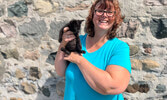Lucknow's Newell-Nicholson working hard to find homes for animals with Adopt-a-Pet Rescue
BY SCOTT STEPHENSON
“Kitten Season” may sound like a cute idea on paper - but for hardworking volunteers like Kathi Newell-Nicholson, the annual onslaught of newborn kittens, that begins before the spring thaw and ends after the first frost, is an exhausting logistical obstacle course. When she first recognized the need for somebody to do something about the emergent issue of an exploding feline population, Newell-Nicholson began her own animal welfare organization in Lucknow - Adopt-a-Pet Pet Rescue. Now, over a decade later, she and a like-minded network of volunteers have improved the lives of hundreds of cats, dogs and occasionally other small animals. Even though it’s currently the height of the worst kitten season she’s ever seen, Newell-Nicholson still took the time out of her Labour Day Weekend to meet up with The Citizen for a quick conversation about what’s making this year a particularly tough one for animal rescuers all over, and what the general population can do to help.
Newell-Nicholson has been in the animal welfare game for a long time now, and it never seems to get any easier. “Every year it feels like there’s more and more, but this year is especially hard,” she explained. While the animals of Huron County are in need of her assistance all year round, it’s during the summertime that every single day seems to be a non-stop rescue effort. There are daily reports of pregnant cats that need to be tended to, orphaned kittens that require formula for nursing, and unfixed feral males to be live trapped, neutered, and released back into the wild. Potentially-adoptable cats need to be vetted and placed in foster care while they await new homes, and rides must be co-ordinated to get animals to where they need to be, whether that’s the cat clinic in Kitchener or a spot in Toronto that finds homes for wayward country cats. At the end of each busy day, there is the knowledge that it will all start over again the next day. This is the harsh reality of kitten season.
This year, there are more kittens than Newell-Nicholson has ever seen before. She’s even found that not even all of the young kittens under her care have found homes yet, which is normally the easiest group for which to find homes. She maintains an up-to-date online database with photos of all her adoptable cats, and hosts “adoption days” at the Pet Valu locations in Wingham and Exeter, as well as Surf’s Up in Goderich. Making potential adopters aware of available animals through these kinds of community hub events can be the key to finding homes for young animals, but it’s not just Huron County that’s dealing with a huge influx of kittens this year - it’s an issue all over Ontario, which means that the available venues for animal adoption are also spread thin this year.
Finding foster homes has also been a challenge. Overcrowding and the mixing of litters can spread disease, so Newell-Nicholson is always careful to put the health of the animals first, even if it means driving a little bit further to find a suitable foster for cats at various stages of vetting. The adoption fee that she charges for each animal frequently doesn’t come close to covering the overall cost of caring for each animal before adoption.
Newell-Nicholson is a big supporter of “Trap, Neuter, Return (TNR)” programs like the one she uses to keep the feral cat population down all over Huron County. She uses live traps to capture the county’s wild cats when she has the resources to do so, and takes them to be vetted and fixed.
Afterwards, she re-releases the animals back where she found them. But each litter born to a feral colony or a couple of unfixed house cats allowed to prowl keeps her further and further from her goal of a Huron County free of unnecessary animal suffering. In her version of a perfect world, the vicious cycle of unchecked breeding amongst uncared for animals has been brought to a halt by the concerted effort of the whole community. Right now, she’s hoping that more people take up the mantle of the collective welfare of our unclaimed animals. She wants to hear from more citizens interested in adopting, or fostering an animal.
If you’re a person concerned about feral cats, she’s urging you to take a course on how to handle the situation, just like she did when she first became concerned. Online courses in TNR are available through programs like Community Cats Toronto, and the more people who take them, the less pressure there will be on those who have already taken on more than their fair share when it comes to animal care.

